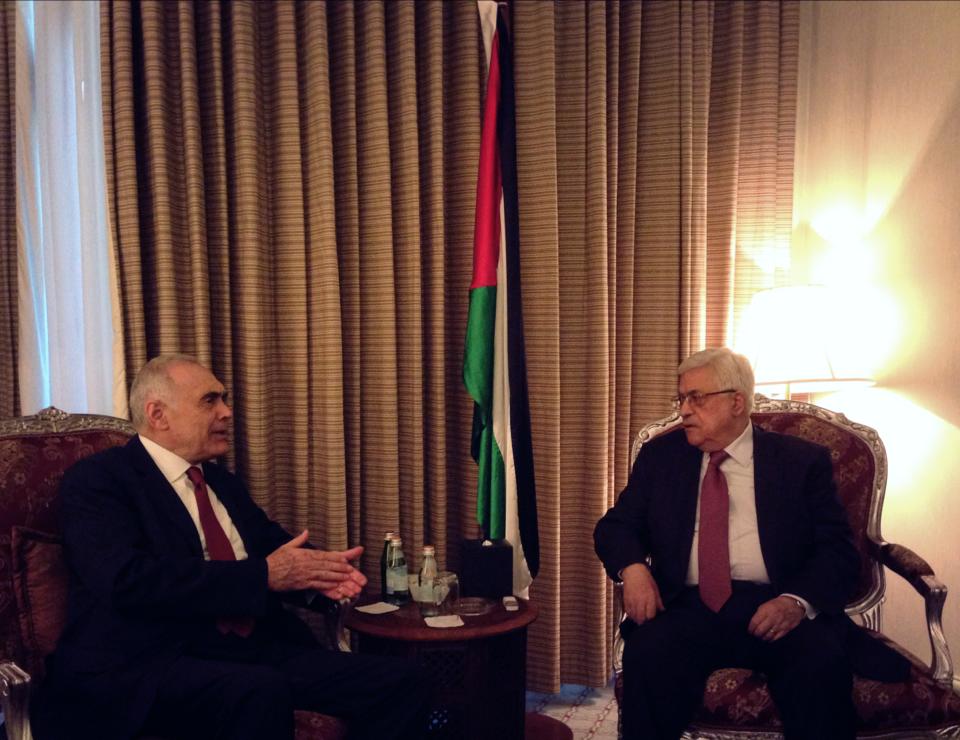Egyptian Minister of Foreign Affairs Sameh Shoukry headed to the Sudanese capital Khartoum on Wednesday, where he is expected to meet with president Omar Al-Bashir after attending meetings of the joint Egyptian-Sudanese political consultation committee.
Shoukry’s visit was supposed to take place on 9 April, but the ministry stated a sandstorm prevented it.
The visit is expected to discuss relations between the two countries and bilateral trade, as well as Khartoum’s potential lifting of a ban on importing some Egyptian agricultural products and ceramics.
Relations between Egypt and Sudan have suffered since July 2013, when former Muslim Brotherhood-affiliated president Mohammed Morsi was ousted. In the past couple of years, multiple issues have caused tensions between the two countries.
Sudan imposes new visa requirements on Egyptian citizens
On 7 April, Sudan issued a decision requiring male Egyptian citizens between 18 and 49 years of age to obtain an entry visa from Sudan’s embassies and consulates when visiting the country, Sudan’s foreign ministry spokesperson, Gharib Allah Khidir, said in an official statement.
The measure excludes women, children, and males over 50 years old, according to Khidir, claiming that the decision came within the framework of the periodic review and evaluation to organise and control entry to Sudan.
Khidir said Sudan is committed to the agreement signed with Egypt regarding the facilitation of entry and the stay of Egyptians in Sudan.
In 2004, Egypt and Sudan signed the Fourth Freedoms Agreement, allowing citizens of both countries to freely move across the border separating them and have the rights to reside, work, and own property in either country without prior permission.
However, Egyptian authorities continued to impose entry visas on Sudanese citizens aged 18 to 49 years, while on the other hand Egyptian citizens were exempted from the entry visa to Sudan in line with the agreement.
This is because Egypt had consented to the agreement to politically back the Sudanese government in its negotiations with John Garang and southern rebels, according to Hany Raslan, an expert on Sudan and Nile basin countries’ affairs at the Ahram Centre for Political and Strategic Studies (ACPSS).
He explained that Egypt informed Sudan at the time that it would be difficult to apply visa-free entries, and that in return it would guarantee entry facilitations to Sudanese citizens, to which Sudan agreed and proceeded with implementing the agreement from its side for Egyptian citizens.
“Sudan has every right to impose an entry visa on Egyptians based on Egypt’s imposition of an entry visa, but in current circumstances it would be considered as political escalation,” Raslan told Daily News Egypt.
Media quarrels
On Wednesday, the Egyptian Foreign Ministry said that during Shoukry’s visit, the two countries will discuss a “media code of conduct”, which reflects respect in both countries’ relations, aiming at “preventing irresponsible actions of some media outlets towards those relations.”
Tensions recently erupted after Sudanese media minister Ahmed Belal Othman was quoted with public statements, saying his country’s pyramids are older than Egypt’s pyramids.
The statements sparked controversy, resulting in reactions ridiculing Sudan’s history and culture in the Egyptian media and social media.
Moreover, the minister’s statement coincided with the recent visit by the Queen Mother of Qatar, Sheikha Moza Bint Nasser, to the pyramids of Meroe.
Given the tense relations between Egypt and Qatar since the ouster of Morsi, Egyptian commentators used the visit to make political accusations against Sudan.
In March, Shoukry and his Sudanese counterpart Ibrahim Ghandour expressed their “full rejection of unacceptable transgressions or insults between the two brotherly countries,” according to a statement by the Egyptian ministry.
Sudan restricts import of products
In September 2016, Sudan suspended imports of fruit, vegetables, and fish from Egypt—citing safety reasons—according to the Sudanese trade ministry.
“Importing fruit, vegetables, and fish from Egypt is temporarily suspended until laboratory tests are completed to guarantee safety,” Sudanese state news agency SUNA quoted a trade ministry statement as saying.
There was no response from the Egyptian government.
“Sudan promotes lies about Egypt’s use of sewage water in agriculture. The proof is that we allocate 57 billion square metres of the Nile’s water in agriculture,” a professor of Water Resources at the Faculty of Agriculture at Cairo University, Nader Nour El-Din, told Daily News Egypt.
He added that “the Sudanese decisions are political decisions and don’t rely on laboratory tests or scientific statistics.”
Halayeb and Shalateen
The Sudanese media minister’s statement resulted in exchanges between media figures regarding which country has a historical claim on Egypt’s southern Halayeb Triangle region.
“It is always talk about the Halayeb and Shalateen triangle that follows any escalation between Egypt and Sudan,” Raslan said.
Halayeb and Shalateen is a triangle of no more than 20 square kilometres, located at the Egyptian-Sudanese border by the Red Sea. The escalation on Halayeb was triggered after the demarcation of borders between the two countries since the era of British colonialism, at a time when Sudan was affiliated to the Egyptian Kingdom.


